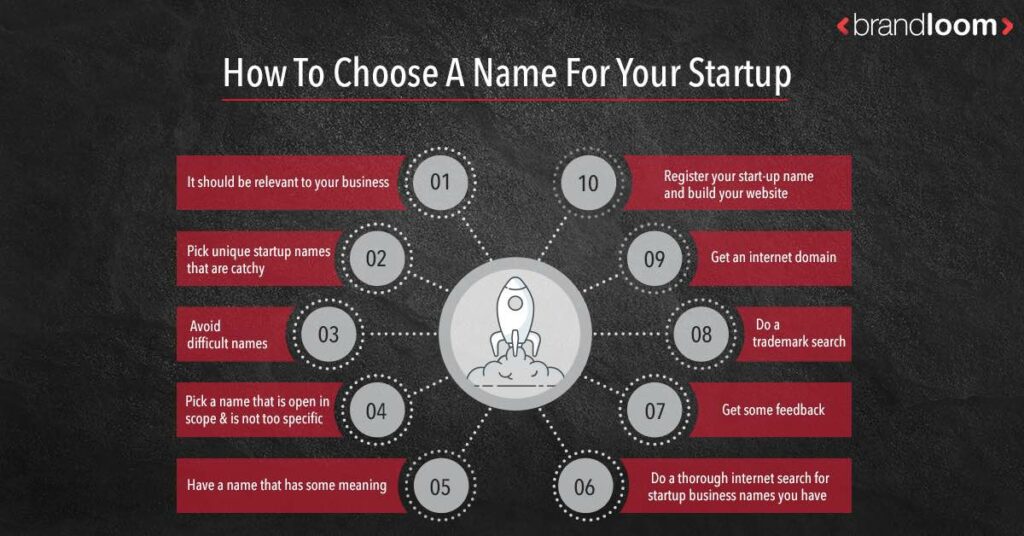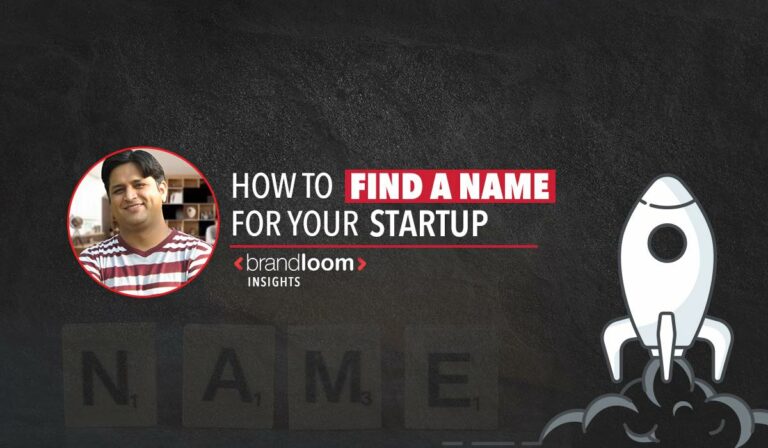What’s in a name?
Shakespeare
Shakespeare famously asked this question.
The answer is- everything.
When you start a business, you have to give it a good name.
Because your customers and prospects will need to remember you by something- and it should be a memorable name. But how to find a name for your startup?
If you are looking for professional help with your startup name suggestions, connect with my team now. My team will help you with the best startup names list in India. My team has extensive experience in generating amazing startup company names.
Otherwise, if you want to go ahead and find startup name ideas on your own, we have some pointers for you.
Best startup names- what will be perfect for you?
Now that you have set up your business- you need a good name for it.
The excellent way to find a creative name is to go for a free startup name generator – but before you start playing with buzzwords & combine them in fun ways- watch out for a few things.

1 Avoid difficult names
Go for creative startup names that are easy to remember. If you go for a name that is hard-to-pronounce, your audience will have trouble remembering it. It will also your brand seem unapproachable. Your target audience will subconsciously avoid a business that appears unapproachable and foreign. So choose one that is easy to spell and easy to pronounce.
Pro tip- think in terms of syllables. How many syllables does your chosen name have? It is excellent if you can find a good name with two or three syllables. This gives you enough scope to create a unique name; while cuts away the chance of coming up with a complicated name.
Think of market leader brands- Amul, Nike, Starbucks, Lux. They chose names that are short and sweet- which are easy to remember. They also contain just a few syllables- which helps customers recall them quickly.
2 Pick unique startup names that are catchy
The idea here is that the name you pick should make you memorable to your potential customers. If the name is too common- they are more likely to forget it.
The reason behind this is simple. You rarely remember something mundane and ordinary. Think of naming your company “John’s Whisky”; e.g., It is very forgettable. But make it Johnnie Walker- and you are more likely to remember it. You can chalk out some great startup names by looking at some market leaders.
3 It should be relevant to your business
How can you make your brand’s name genuinely unique? It is when you distill the values or features that are quintessential to your business.
For example- Birista Special or Lukhnow House can be some good names for biriyani startups. But try to imagine if a soda company uses these names. It will be pointless and feel jarring to any customer who sees them.
If you want some cool startup names, think of what your brand is about.
- What are the products or services you provide?
- Are you active in specific geographic locations?
- Who is the target audience? What are their gender, age, likes, and dislikes?
- What is your USP?
- What are the features unique to your brand or product?
- What are your values?
- Is there a message you want to send out to your audience right away?
- What is the brand’s personality?
- Do you want your audience to take some action promptly?
- What is the dominant emotion you want to invoke in your audience?
Ask yourself these questions. Now, identify the specific words that define these answers. Then, look at these particular words together- and think:
- Is there a particular word in this list that perfectly captures the essence of your brand?
- Will an amalgam of a couple of words do it?
- Look for any name or thing that perfectly symbolizes these key terms.
Brainstorming along these lines will help you come up with a robust startup names list. You can find the perfect name for your business from that list.
Then comes the next step.
4 Pick a name that is open in scope & is not too specific
Let’s say you have a shoe business. You can name it High Heels. But after five years, your business is doing well, and you want to branch out. You want to sell bags too. Think how incongruous the name “High Heels” will feel when you put that label on a handbag.
So, it would help if you always had a name that is open and not very limiting in its description. Remember- you build your brand around your chosen name. If that name is too specific- it will hamper your chances of branching out. Then, you have to create different labels with different brands- and begin the branding process anew.
So, go for an open-ended brand name.
5 Have a name that has some meaning
An utterly meaningless name is not that uncommon- but if you are a startup, it is good to give your audience something to remember. And they are more likely to remember a word or name that has some meaning- or at least sounds like an amalgamation of words with meaning.
Take Complan, for example. As a standalone word, it doesn’t really have any meaning. But, it brings to mind two words- Complete and Plan. Some other popular brands with meanings in their names are – Glow & Lovely, Everyuth, Dairy Milk & Sundrop.
But not all names need to make sense in English. For example, Indian brands can look at Sanskrit names for startups. Maruti is a Sanksrit word that refers to Lord Hanuman- the son of the god of wind.
Personal names can also be used for naming brands like HP, Ernst & Young, or Tesla.
6 Get some feedback
When you come up with a name- you are biased towards it. But it would be best if you had an impersonal opinion of how the name sounds. The only way to do that is to get feedback on the names you like.
Ask your friends and family or acquaintances what they think of it. Better- go for a focus group. A focus group consists of random people who have no bias towards or against you. They can provide an objective opinion on the names that they see.
Of course- the end decision lies with you. You may disagree with others’ opinions. Nevertheless- it is vital to take an outsider perspective on the names you are planning for your startup.
7 Do a thorough internet search for startup business names you have
When you have shortlisted a bunch of names- Google them one by one. Fire up the search engines and see what results come up. Are these names taken? Do they have cultural significance? Are they associated with anything unsavory? It’s no wonder anybody has ever named their brand Adolf- for example.
Doing your research on the internet should be a prelude to the next steps.
8 Do a trademark search
When you have a business, you have to register it. So, you should ensure that the name you pick for your startup is unique and is not copied from anyone else. If you use some other brand’s copyrighted name- you can end up in legal trouble.
You should check for the availability of the name you have in mind right in the beginning. A unique name will also help you get a domain name for your website quickly.
9 Get an internet domain
Now that you are satisfied that you have chosen the right name- you have to get the internet address for your planned website. Go to websites like GoDaddy, Hostgator, or Bluehost. Check whether the domain of your choice is available.
Go for a dot com domain
This is where things get tricky. You may find that the exact name you had in mind is already taken. There are two ways to go from here- you either work around the word or change the domain.
For example, when your start-up’s name is Iris, you may not get the name Irisgroup.com.
You can either change it to Iriscorp.com.
Or go for Iris.net.
Always try to get a .com domain for your business. Try playing around with your selected name. Look for options that ring the closest to the original version. Do not try to complicate your site’s address by adding more words- keep it simple.
10 Register your start-up name and build your website
The next step, of course, is registering your business with the right name and completing all the legal requirements. Congratulations! You have set up a business now!
Now that you have a name for your business- you need a logo and possibly a tagline. What kind of logo will suit your brand? Here are some pointers.
The next thing that your business needs is a good website. If you have a business and don’t have a website- you might as well be non-existent. So, create a good website and start reaching out to people online with all the necessary information. Create your social media handles, and you are set.
So, if you have a business idea & want to strike out on your own- here is a rough rundown on how to name a startup. Innovative startup names have a way of latching on to public consciousness- so if you can find a catchy and memorable name for your business, you have a solid foundation on which to start building your brand.
Related articles Video Marketing Strategies for Start-ups
Startup Name Generators
If you need some help- look up a name generator for startups. Here are some startup company name generators:
Conclusion
So, are you ready to name your startup? Let us know if our method has been helpful. If you have some extra tips for us- we will be happy to hear from you in our comments.
Remember- your name is your brand’s identity. Choose wisely, and you will reap the rewards for a long time.
FAQs
How do I find my catchy name?
If you want a catchy name- be short and sweet. Choose unique names- which should at least sound like they have a meaning. Of course, you can make up a name; but people tend to remember familiar sounds, so you might want to go for startup company names that are meaningful.
Find names that are associated with the products or services you offer. For example, if you brainstorm for startup name ideas for solar panels- Apollo may be a good choice. This is because Apollo is the sun god from Greek mythology.
Remember, your name should appeal to your target audience. So, choose names they are likely to remember. A law practice or consultancy firm may be named after the founders, for example. On the other hand, Shakespeare and Company is an excellent name for a bookstore.How do I name my small business?
When you have a business- you should go for a name that 1)represents the essence of your brand and 2)appeals to your target audience.
What are the products & services you provide? What are your values? Where do you take your inspiration from? What do you want to communicate to your customers? It would help if you asked yourself questions like this to get a sense of what your brand stands for.
Then, look at your target audience. Small businesses must do this before they start. Who are they? Where do they stay? What is their gender? What age group do they fall in? How much do they earn? What values do they hold dear? What are they looking for? Is something motivating their actions? What are their likes and dislikes?
When you have the answers to these questions, you can compare your notes side by side and brainstorm. Jot down a list of names that come to your mind that satisfies both criteria.
Then- take some external feedback on your choice of names. Finally, check whether they are trademarked or not. If they are available- Voila!How can I find a good name?
The best company names for startups are short, memorable, and meaningful. The name you choose should appeal to both you are your target audience. It should also convey something essential about your company- its offerings, personality, and values.
If you are not satisfied with your brainstorming efforts- check out these business name generators; which can help you:
Shopify
GoDaddy
Namify
Business Name Generator
Squadhelp
Namelix
After you have a bunch of options, Google them and see what comes up. Then, do a trademark search. Finally- look up the availability of internet domains to register your brand’s website. Keep your website’s name simple. If the name of your choice is not available- work around it and take the name that is closely echoing your original choice.







